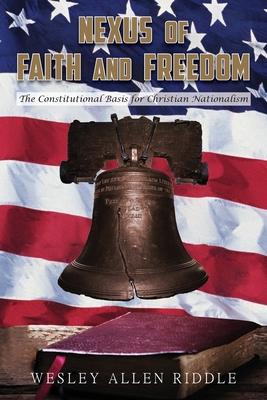Ronald Reagan understood the integral nexus (a connection or link) between faith and freedom. He spoke movingly about faith and its importance to our nation and pointed out how freedom is related to America's religious and specifically Judeo-Christian heritage. In America, rights are said to be derived from God (the God of the Old and New Testament), not from government. In Nexus of Faith and Freedom, author Wesley Allen Riddle explores complex and controversial issues, such as the separation of church and state, the right to pray in public, and pro-life's moral presumption for the sanctity of human life. He provides considerable historical, philosophical, and constitutional rationale for the right of citizens to stand up against secularization, in particular the crowding out of religious liberty by government edicts affecting private decisions and religious expression in the public square. Riddle's case strongly references the Constitution and Founders' Original Intent, and their almost universal faith-based worldview. The Founders certainly envisioned a qualitatively good Republic, as well as a free and virtuous people. What was considered good and virtuous was delineated in the Bible. A central argument Riddle makes is that faith begets freedom. If faith is on the wane in America, freedom itself is placed in jeopardy. Faith and freedom in America, historically, raised and supported each other as friends and allies in symbiotic fashion. The Constitution was never meant to be antagonistic to religion, but rather mutually reinforcing. Nexus of Faith and Freedom is heavily indexed and sourced and offers a textbook treatment on the role of religion and the Founders' concept of ordered liberty. Moreover, it presumes the American nation is under providential care of God, that freedom as conceived by the Founders is ideally supposed to be righteous, that America has been in the past and can again be, an exemplary Nation among nations. The book is academic and at the same time, unapologetically patriotic. It offers lucid contemporary description and advocacy for what can be called the original "Christian nationalism: '

Nexus of Faith and Freedom: The Constitutional Basis for Christian Nationalism
Ronald Reagan understood the integral nexus (a connection or link) between faith and freedom. He spoke movingly about faith and its importance to our nation and pointed out how freedom is related to America's religious and specifically Judeo-Christian heritage. In America, rights are said to be derived from God (the God of the Old and New Testament), not from government. In Nexus of Faith and Freedom, author Wesley Allen Riddle explores complex and controversial issues, such as the separation of church and state, the right to pray in public, and pro-life's moral presumption for the sanctity of human life. He provides considerable historical, philosophical, and constitutional rationale for the right of citizens to stand up against secularization, in particular the crowding out of religious liberty by government edicts affecting private decisions and religious expression in the public square. Riddle's case strongly references the Constitution and Founders' Original Intent, and their almost universal faith-based worldview. The Founders certainly envisioned a qualitatively good Republic, as well as a free and virtuous people. What was considered good and virtuous was delineated in the Bible. A central argument Riddle makes is that faith begets freedom. If faith is on the wane in America, freedom itself is placed in jeopardy. Faith and freedom in America, historically, raised and supported each other as friends and allies in symbiotic fashion. The Constitution was never meant to be antagonistic to religion, but rather mutually reinforcing. Nexus of Faith and Freedom is heavily indexed and sourced and offers a textbook treatment on the role of religion and the Founders' concept of ordered liberty. Moreover, it presumes the American nation is under providential care of God, that freedom as conceived by the Founders is ideally supposed to be righteous, that America has been in the past and can again be, an exemplary Nation among nations. The book is academic and at the same time, unapologetically patriotic. It offers lucid contemporary description and advocacy for what can be called the original "Christian nationalism: '